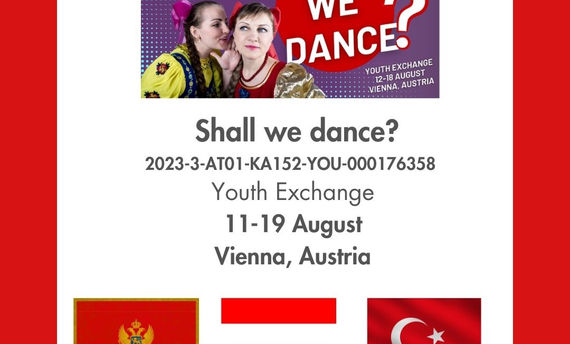Shall we dance? Project
2023-3-AT01-KA152-YOU-000176358

Webpages (7 languages)
Videos
Presentations
Newsletters
Dissemination Report
Posters
ABOUT
In recent years, Europe has grappled with complex challenges affecting its young population. These challenges stem from conflicts, geopolitical tensions, and regional disputes, including the Russian invasion of Ukraine, as well as the displacement of migrants from areas like the Armenian-Azerbaijani regional conflict and other potential conflict zones. These events have triggered a significant wave of migration across the continent, resulting in a series of pressing issues that require immediate attention and concerted efforts. Among these challenges, there is a critical need to protect the rights and dignity of all young Europeans, particularly those in vulnerable and marginalized positions. Curiously, the surge in migration has not always led to unity and understanding; instead, it has given rise to cultural tensions. This has led to xenophobia, discrimination, and social exclusion, creating what we term 'red zones' of discrimination in various parts of Europe. These deep-seated issues have left indelible scars on our society, dividing communities and perpetuating exclusion. Urgent action is essential to address these challenges and cultivate a more inclusive and harmonious Europe for its young people. Acknowledging these pressing issues and taking a step toward social progress, we proudly present our project, "Shall We Dance?". At its core, this initiative is founded on the belief that traditional folk dances, art, and creativity have the unique power to transcend cultural boundaries. They serve as a universal language capable of combatting discrimination, nurturing inclusion, and promoting understanding among diverse communities.
The primary objective of "Shall We Dance?" is to create a dynamic and inclusive environment where marginalized youth can find empowerment and a profound sense of belonging that transcends the divisive barriers within their communities. The overarching goal of our project is to make a substantial contribution to building an inclusive, just, and diverse European society, where all young people have equal opportunities to thrive. In practical terms, "Shall We Dance?" is a project that harnesses the power of traditional folk dances, art, and creativity as tools for social inclusion and change. Through these means, we aim to address the critical issues of discrimination, prejudice, and marginalization that plague our society.
With the implementation of this project, we aim to achieve the following objectives: Foster Intercultural Dialogue and Learning: Our primary goal is to facilitate profound intercultural dialogues among young participants. These dialogues will serve as catalysts for mutual respect, understanding, and a deep appreciation for the vibrant tapestry of diversity within our society. Utilize Traditional Folk Dances for Inclusion: We aim to harness the transformative potential of traditional folk dances to foster inclusivity, tolerance, and non-formal education among our participants. Challenge Prejudices and Stereotypes: "Shall We Dance?" serves as a powerful platform for dismantling entrenched prejudices and stereotypes about different cultures. Through shared experiences and cultural exchange, we aim to reshape attitudes and perceptions. Promote a Shared European Identity: In addition to these goals, we are dedicated to nurturing a profound sense of belonging and a shared European identity among our participants. This sense of unity will transcend the artificial barriers that have long divided us, allowing us to celebrate the richness of diversity that enriches our society. Our participating countries in the project, including Austria, Bosnia, Ukraine, Macedonia, Turkiye, and Montenegro, are particularly significant in this context. Many of these nations have faced regional disputes, political tensions, and wars that have led to significant migrations in the past and present. These shared experiences make our project particularly relevant, as it addresses the challenges and needs specific to these countries while contributing to the broader goal of creating a more inclusive and harmonious Europe.

Funded by the European Union. Views and opinions expressed are however those of the author(s) only and do not necessarily reflect those of the European Union or the European Education and Culture Executive Agency (EACEA). Neither the European Union nor EACEA can be held responsible for them.













